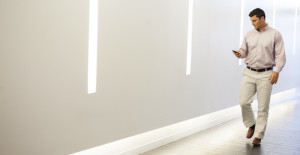by Elle Ray | Sep 11, 2014 | Writing
We Have to Sit at the Computer During Summer

Ray Access is a content provider and content marketing business. That means we are writers and editors. In order to earn our income, we write. On a computer. At a desk. Inside an office. Regardless of the weather, the day of the week or even the time of day.
Fortunately, both Linda and Mark work at desks in rooms with windows that look out onto views with lots of green. We can see the sun shine and the clouds roll in and the rain begin. We can see the world pass by. Then it’s back to work.
Trapped in a Job?
That makes it sound as if we were chained to our desks, but the truth is far from that. We take frequent breaks. We stretch. We stroll around the room while thinking how best to help our clients. We do what we need to do to keep our bodies healthy and our minds sharp. Because we are writers, we get paid to write. If we’re not writing, we’re not making money.
So Linda and Mark of Ray Access have developed a term for the time we’re working. OK, actually, it was Linda who came up with the term, but now we both use it. It’s “B.I.C.” or “Butt In Chair.” If we don’t have our butts in the desk chairs, we’re not working. In other words, work starts when butt meets chair.
We All Sacrifice
Some people have to rise early to commute to a factory job where all the windows are 30 feet above them. Others drive around all day, stuck behind a wheel. Still others toil under the hot sun attaching shingles to wooden frames. Everyone has something to do for the job. Working — earning money to put food on the table — often entails some form of sacrifice.
So that’s how it is for us. Even on a gorgeous day, we’re usually inside typing away on a keyboard. Is it Saturday? Sunday? It doesn’t matter; you can still reach us on our cell phones, because we’re often still at our desks. Now that it’s September, we look up and realize summer has passed us by. It’s one of the occupational hazards of writing for a living.
Writing Is Our Passion
But it’s not that much of a sacrifice for us because writing is what we love to do. This blog post is evidence, since we don’t get paid for writing for our own blog. We do it out of love.
We like to think we’re adding value to our website by educating our readers about our business. But like most dedicated writers, we’d do it even if no one read our words. We’re writers; we have to write.
And that’s why we’re so perfectly poised to help your business. Because we love to write, because we’re so good at it after years of practice, we are the best options to rewrite your website, to create content for your business blog and to turn your company newsletter from a ho-hum read to a compelling one. Discover the difference professional writers can make to your business. Act now, you get not one, but two writers working for you, all for the same price!
Ray Access is a content marketing firm that delivers targeted words to empower your business. Contact us about your specific project to receive a quote or discuss your needs. We write website copy, blog posts, e-newsletters and more. Everything we do is thoroughly researched, professionally edited and guaranteed original.
by Mark Bloom | Aug 1, 2014 | Writing
When You’re Stuck for the Right Words
Everyone goes through periods when the words just won’t come. You sit and stare at the page or the screen, and you can’t imagine what comes next, whether you’re working on a novel, a blog post or a letter to your brother in Raleigh.

Writer’s block. When it hits, it stops all your creative juices. You feel like a second-grader on the day of the spelling bee. You begin to wonder if you bit off more than you could chew by volunteering to write the invitation to your Labor Day party.
There’s Hope, Even for You
We are professional writers and editors here at Ray Access. We can’t afford to get stopped by writer’s block. Literally, we can’t afford it.
So we’ve developed a few simple tricks and tips to jump-start our creative juices when we need them right now. We’d like to share them with you, so you don’t fall victim to this productivity-stopper. Fear not; there is hope for you, not matter what your level of writing or the scope of your writing project.
Step 1: Acknowledge & Recover
Writer’s block happens; it’s not anything you did. Repeat this to yourself: “Writer’s block happens; it’s not my fault.” Accept it. You aren’t suffering writer’s block because you’re a crappy writer or because all your good ideas have dried up. Writer’s block happens to every writer at one time or another.
Once you can accept that, you can begin to recover from the initial shock of helplessness. And that’s what writer’s block feels like: helplessness, the inability to do work or be productive.
Step 2: Shake It Off
 When you’re stuck, the best thing to do is to do something to clear your mind. Put aside your pen, stylus or keyboard. Get up from wherever you’re sitting. If you’re suffering from writer’s block, it’s definitely time for a break. Get a cup of coffee or tea. Stretch your muscles, take a walk, meditate, or go for a drive or bike ride. A change of scenery definitely helps recharge your batteries.
When you’re stuck, the best thing to do is to do something to clear your mind. Put aside your pen, stylus or keyboard. Get up from wherever you’re sitting. If you’re suffering from writer’s block, it’s definitely time for a break. Get a cup of coffee or tea. Stretch your muscles, take a walk, meditate, or go for a drive or bike ride. A change of scenery definitely helps recharge your batteries.
Another trick is to remember how good a writer you really are. It’s empowering to review your older work, even if it’s just past letters you wrote. If you wrote that, you can write anything. Trust yourself.
Step 3: Try Something Different
Allow yourself to look at your project from different perspectives or different angles — including from above and below. You might have missed something. When all else fails, put it aside and work on something else, like a timed writing exercise. Here are some tips:
Write for ten minutes about your favorite color, food or person. Here are the only rules:
- Write freehand, pen on paper, for the best results.
- Keep your hand moving.
- Don’t cross out.
- Don’t worry about spelling, punctuation or grammar.
- Lose control. The whole idea is to let go.
- Don’t think. Don’t plan. Don’t get logical.
- Go for the jugular. Dive into absurdity and write. Take chances. You will succeed if you are fearless of failure.
Step 4: Look for Good Advice
Erica Jong, author of Fear of Flying and other books, believed that “all writing problems are psychological problems. Blocks usually stem from the fear of being judged. If you imagine the world listening, you’ll never write a line.”
For writer and poet Charles Bukowski, “Writing about a writer’s block is better than not writing at all…”
Author Lili St. Crow summed up the feeling: “You do not sit down and write every day to force the Muse to show up. You get into the habit of writing every day so that when she shows up, you have the maximum chance of catching her, bashing her on the head, and squeezing every last drop out of [her].”
With that thought in mind, make your deal: “OK, Muse, you take care of the quality; I’ll take care of the quantity.” Then it’s just a matter of getting your butt back in the chair to write again. It works for us.
Ray Access is a content marketing firm that delivers targeted words to empower your business. Contact us about your specific project to receive a quote or discuss your needs. We write website copy, blog posts, e-newsletters and more. Everything we do is thoroughly researched, professionally edited and guaranteed original.
by Elle Ray | Jun 10, 2014 | Writing
How to Write Effectively in the 21st Century
Today’s Shakespeares look harder at page rankings and reader conversion numbers than at what’s actually on the page. But those days are fast coming to a close. Search engines have been tweaked to recognize the keyword-stuffed, quick-hit advert-articles that have plagued the Web for years. Now they are seeking — nay, demanding — that you put consistent, meaningful quality content on your website or just go home.

The Long or Short of It
The average visitor to a website leaves within 10 to 20 seconds — but that assumes there is obviously nothing of value on the page. Research now shows that if you can capture the attention of readers within those first important seconds, you can keep them there for much longer. And the longer the visit, the more likely you’ll make a sale.
The days of needing to keep blogs, Web pages and articles short to hold readers’ attention are gone. Born again is the prospect of enticing readers to continue reading, to find value in your writing and to stay — and even scroll — to finish your piece. According to researchers at Microsoft, the length of your copy is not as important as the first few lines of copy you offer. So whether you write 250 words or 2,500 words, if you don’t capture readers’ attention in the first couple lines, they’re out of there. Click.
Search Engines Like Quality
Now, attracting readers in the first place is another story. The top 10 listings on Google for a sample keyword search each had more than 2,000 words on their landing pages. The sites aren’t ranked high just because they have a lot of copy; they receive the top spots because they have a lot of rich copy — words that convey a useful message, a message that readers want to read and can’t stop reading. Websites that provide more of what readers want are getting the most respect from search engines.
The adage that’s been working its way through the Web-marketing world the last few years is: “Copy is king.” It seems now that copy is king, queen, jack and the entire court.
 Readers Like Quality
Readers Like Quality
Readers prefer rich copy, too. They are more willing to re-post blogs with longer, useful content than shorter, unappealing copy. Quick Sprout analyzed 327 blog posts and found that posts with more than 1,500 words received 22.6 percent more likes on Facebook and 68.1 percent more tweets than shorter articles.
One phenomena linked to these findings is that people are searching for more complex terms than ever before, using up to eight words in a search — which by the way is called a “long tail.” With more copy, you increase the odds that you’ll fit those searches. When they find you, the odds also increase that readers will convert to customers too.
So when asked whether it’s better to write more or less, the answer today is: “More is better!” Richer is better and more is better. But when you’ve got to have it all done right, more rich content is something that we at Ray Access can do too.
Ray Access Today
We’ve bought into the traditional rap that blogs need to be fewer than 500 words to be effective. But we’re retuning our concepts to align with the Google monster that rules so much of what occurs on the Web. Expect to see longer blogs from us occasionally. It’s still time-consuming, and we’ll have to charge more for longer blogs, but with the right combination of length and quality, we expect to get better results, just as you will.
We can’t just throw up some nonsense blog or give you just a quick peek at a really hot new trend. We’ve got to give you reasons and research, reality and really rich rewards if we expect you to stay. And if we expect you to convert and call us, we better give you something worth your while. Let us know. Did we?
Ray Access is a content marketing firm that delivers targeted words to empower your business. Contact us about your specific project to receive a quote or discuss your needs. We write website copy, blog posts, e-newsletters and more. Everything we do is thoroughly researched, professionally edited and guaranteed original.
by Mark Bloom | Jun 4, 2014 | Writing
Choosing the Right Tone and Language

Targeting your website — or any communication from your company to your customers — is a matter of building a relationship. To make that connection, you have to use language that’s familiar to those you’re trying to reach. For example, it may be all right to use slang when you’re writing to attract teenagers, but not when your audience is composed of CEOs.
The language and style you employ in your writing should be geared to the audience — the customers — you want to attract. Speak their language, and you stand a better chance of connecting with them. If you build a relationship with your target demographic, whatever it is, you’ll stand a better chance of selling your products or services to them.
How Ray Access Does It
When we take on new clients, we always pose the same set of questions. One of them includes who their customers are: the general public, doctor’s offices, or women aged 35–55. Your target audience defines how we will write both your website and your blog posts.
We like to meet our clients in person, to get a feel for who they are and to listen to them when they speak. When we start writing for them, we set aside time for the client to approve the style and language, as well as the content, of our initial draft. We expect some back-and-forth of the copy until our client approves.
One time, a client removed all the contractions we’d put into the copy. Another client changed specific words. It’s exactly the kind of feedback we want at this stage. Once we know our client’s preferences, in addition to the target audience, we know we can deliver content that will appeal to both our client and the intended audience.
How You Can Do It
 If you want to create your own content — for your website, your blog, or your brochure — you must know who you want to read what you write. Who is your audience? Who will buy your products or services? Write to them in a friendly, engaging way.
If you want to create your own content — for your website, your blog, or your brochure — you must know who you want to read what you write. Who is your audience? Who will buy your products or services? Write to them in a friendly, engaging way.
Whether you need to be formal or casual depends on both your personality and your audience. Study your competitor’s websites. See what type of language they use. Are they doing a good job connecting to their audience? How can you be different enough to stand out? These simple questions can point you in the right direction.
When You Can’t Do It
If you get stuck, or if you don’t know where to start despite the advice in this article, contact Ray Access for help. We are pros when it comes to writing your website, your blog posts, your brochure or whatever you need. We’ve written hundreds of blog posts for a diverse set of clients. We’ve written websites as small as six pages and as large as over a hundred pages. Since we are a partnership, we write and edit everything that we send to you, so you can be sure it’s clean copy free of errors.
Let us be your voice to your customers!
Ray Access is a content marketing firm that delivers targeted words to empower your business. Contact us about your specific project to receive a quote or discuss your needs. We write website copy, blog posts, e-newsletters and more. Everything we do is thoroughly researched, professionally edited and guaranteed original.
by Elle Ray | Mar 23, 2014 | Writing
Anyone Can Benefit from These Tips, Even You!
Here at Ray Access, we are professional writers. We became writers the old-fashioned way: we worked at it by writing and rewriting. You can too. Here are three simple things you can do to improve your writing skills.
1. Read

That’s right: reading helps your writing. Ideally, we suggest that you read the types of things you want to write. If you want to write science fiction, load your shopping cart with Isaac Asimov and Arthur C. Clark. If you want to write for the newspaper, read — not scan, but really read — everything from the local rag to the New York Times. And of course, if you want to blog, read other blogs. Like this one!
Here’s how it works: when you read, your mind takes in the words on the page, the ideas behind those words, and the way the words are strung together. Before you can write like a genius, you have to know what a genius writes like.
It’s also important to read a variety of authors, so when you begin to write, you don’t subconsciously copy the tone and cadence of the one you like the best. A little of that likely will happen anyway, but your influences gradually fade as your own voice becomes stronger.
2. Write
 Like any skill, writing requires practice to improve. If you wanted to become a better baseball pitcher, you’d have to practice throwing. To become a better carpenter, you spend years refining your skills and knowledge. Writing is no different.
Like any skill, writing requires practice to improve. If you wanted to become a better baseball pitcher, you’d have to practice throwing. To become a better carpenter, you spend years refining your skills and knowledge. Writing is no different.
Now you’ve probably heard that writing is an “art,” meaning it’s something only artists can do. At a certain level, that’s true, but very few people reach that level. For the rest of us, writing is a craft, like knitting or driving. The more you do it — when you have the intention of improving; when you do it consciously — the better you’ll get at it.
The best advice for becoming a better writer is to write. Practice every day. It doesn’t matter what you write about or how good that writing is. Just keep writing. Keep a journal. Your writing will improve the more you do it.
3. Solicit Constructive Criticism
 When you feel you’re ready to share your writing, find a person or a group who promise to be brutally honest. Sharing your writing with your mother or your best friend might be nice for them, but it usually will not improve your writing. You need an objective, impartial reader.
When you feel you’re ready to share your writing, find a person or a group who promise to be brutally honest. Sharing your writing with your mother or your best friend might be nice for them, but it usually will not improve your writing. You need an objective, impartial reader.
Writers need feedback. Writers need to have their work read. It’s the primary reason Mark left the lucrative field of technical writing: no one reads technical manuals except other technical writers. Mark needed a broader audience. You will too when you suddenly find yourself writing.
So continue to read, write every day, and seek outside feedback. These are three things you can do, in order, to become a better writer. Writing a blog post will no longer feel like climbing Mount Everest. Composing a letter or email will no longer take all day. And maybe someday you can join the ranks of professional writers, just like Linda and Mark of Ray Access.
Ray Access is a content marketing firm that delivers targeted words to empower your business. Contact us about your specific project to receive a quote or discuss your needs. We write website copy, blog posts, e-newsletters and more. Everything we do is thoroughly researched, professionally edited and guaranteed original.
by Elle Ray | Jul 26, 2013 | Writing
The Problem with Creating Effective Writing
Anyone with a fourth-grade education thinks he can be a writer.
Writers aren’t like athletes, who have visible physical attributes that define their profession. We’re not like scientists who have a wall full of diplomas. We look like ordinary people, so it’s easy for an untrained and unproven writer to blend in.
If any literate person with a pencil and a notepad can sit down and write something, then what’s the value of a professional? It’s not our spelling or grammar. It’s our skill at rhetorical writing. It’s our imaginative use of words. It’s our ability to get to the heart of a message and verbalize it. It’s our uncanny knack for saying the right thing at the right time.

What Good Writing Does
Good writing, therefore, isn’t just spell-checked writing. Good writing serves a purpose. It answers questions, makes the complex understandable, and fills a need.
For example, let’s say you have a website to sell cars. If your home page shows photos of the cars you sell and lists the technical specifications, it has some value. You know potential customers can come to your site, do their research, and decide if one of your cars is right for them.
But if your home page instead highlighted the cars’ best features and told stories about what makes your cars so great, you may get those potential customers to invest time and emotion into your products. You may be able to persuade those website visitors that not only are your cars great, but your company or dealership is the best place to buy them.
Why Good Writing Matters
We’re advocates of good writing not just because we’re writers. We want to see the world a better place, and good writing — good communication — helps move it in that direction. The art of writing is the art of storytelling. The art of rhetorical writing is the art of shaping a story to a target audience.
 You have a story to tell. You have a product or service to sell. The two merge in the message. Your website, your blog and your communications should all reflect your core story in understandable ways. Your business writing should reach out and attract, entice and tantalize. Good writing can accomplish this.
You have a story to tell. You have a product or service to sell. The two merge in the message. Your website, your blog and your communications should all reflect your core story in understandable ways. Your business writing should reach out and attract, entice and tantalize. Good writing can accomplish this.
Not Tricks, But Techniques
Good writing can combine business and pleasure. In other words, if you’re blogging about your catering business, you can write about the new royal boy named George and tie it into your business, whether through a special, a new item, or just a pondering about what the parents eat. It’s a technique that can potentially find a wider audience than people looking for caterers. And it works.
Another technique is to explore your business. There is more to catering, for example, than meets the eye, especially if the eye belongs to your customers. They don’t know what goes into making those delicious cakes and pies show up on time and piping hot. That’s what your blog can do; that’s what a blog is for: educating your customers. And if you can entertain them along the way, you’ll make friends and loyal fans.
This is what we do at Ray Access: we help you make fans. We help you reach out to potential customers with good writing techniques and stories that explain your advantage and uniqueness. Anyone can pick up a pencil, but not everyone can manage good writing. That’s why there are pros like us.
Ray Access is a content marketing firm that delivers targeted words to empower your business. Contact us about your specific project to receive a quote or discuss your needs. We write website copy, blog posts, e-newsletters and more. Everything we do is thoroughly researched, professionally edited and guaranteed original.



 When you’re stuck, the best thing to do is to do something to clear your mind. Put aside your pen, stylus or keyboard. Get up from wherever you’re sitting. If you’re suffering from writer’s block, it’s definitely time for a break. Get a cup of coffee or tea. Stretch your muscles, take a walk, meditate, or go for a drive or bike ride. A change of scenery definitely helps recharge your batteries.
When you’re stuck, the best thing to do is to do something to clear your mind. Put aside your pen, stylus or keyboard. Get up from wherever you’re sitting. If you’re suffering from writer’s block, it’s definitely time for a break. Get a cup of coffee or tea. Stretch your muscles, take a walk, meditate, or go for a drive or bike ride. A change of scenery definitely helps recharge your batteries.
 Readers Like Quality
Readers Like Quality
 If you want to create your own content — for your website, your blog, or your brochure — you must know who you want to read what you write. Who is your audience? Who will buy your products or services? Write to them in a friendly, engaging way.
If you want to create your own content — for your website, your blog, or your brochure — you must know who you want to read what you write. Who is your audience? Who will buy your products or services? Write to them in a friendly, engaging way.
 Like any skill, writing requires practice to improve. If you wanted to become a better baseball pitcher, you’d have to practice throwing. To become a better carpenter, you spend years refining your skills and knowledge. Writing is no different.
Like any skill, writing requires practice to improve. If you wanted to become a better baseball pitcher, you’d have to practice throwing. To become a better carpenter, you spend years refining your skills and knowledge. Writing is no different. When you feel you’re ready to share your writing, find a person or a group who promise to be brutally honest. Sharing your writing with your mother or your best friend might be nice for them, but it usually will not improve your writing. You need an objective, impartial reader.
When you feel you’re ready to share your writing, find a person or a group who promise to be brutally honest. Sharing your writing with your mother or your best friend might be nice for them, but it usually will not improve your writing. You need an objective, impartial reader.
 You have a story to tell. You have a product or service to sell. The two merge in the message. Your website, your blog and your communications should all reflect your core story in understandable ways. Your business writing should reach out and attract, entice and tantalize. Good writing can accomplish this.
You have a story to tell. You have a product or service to sell. The two merge in the message. Your website, your blog and your communications should all reflect your core story in understandable ways. Your business writing should reach out and attract, entice and tantalize. Good writing can accomplish this.